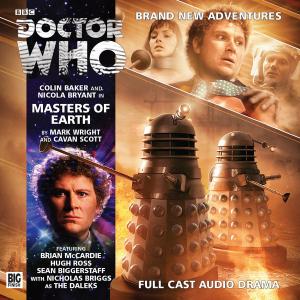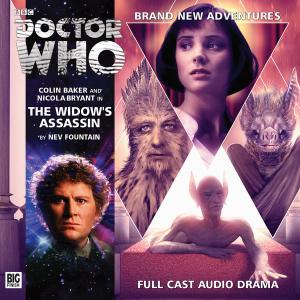The Brood of Erys
The Brood of Erys
Released by Big Finish
Written by Andrew Smith
Directed by Nicholas Briggs
Released: Feb 2014
Remember how after making promising progress in terms of their narrative trajectory, recent modern Doctor Who serials such as “Night Terrors” and “Into the Dalek” somehow managed to squander their potential come their respective final acts by making sudden forays into overly sappy territory (if this reviewer never has to endure the sight of the Doctor teaching ex-Kaleds the beauty of the stars again, it’ll be too soon)? Well, much as The Brood of Erys, the second outing in Big Finish’s January – March 2014 trilogy of Sixth Doctor and Flip storylines, does its utmost to maintain a consistently impressive benchmark of quality throughout its four contributory episodes, so too does the 183th chapter in the aforementioned studio’s never-ending range of Who-themed audio dramas lose its way at precisely the wrong moment, thereby threatening to ruin its audience’s perception of what might otherwise have been one of Colin Baker’s finest off-screen hours to date.
More on that momentarily, however – let’s first align our metaphorical TARDIS scanners towards Brood’s strengths, since in spite of its lacklustre denouement, the drama in question can’t possibly fail to hook its listeners during its opening three-quarters. Central to its resounding success in this respect is the pair of increasingly tight-knit travellers currently piloting their Type 42 machine through time and space; although one gets the sense nowadays that Baker’s incarnation – nor the man himself, if his recent revelatory interview with DWM was any indication – will never quite shed his reputation as the version of the Doctor who underwent one of the weakest overall runs in the show’s history, the 72-year old thespian responsible for bringing the character to life during the mid-1980s has rarely been on finer form than he is here. Channelling all of the compassion and bombast he can muster as old ‘Sixie’ and his faithful accomplice explore a sentient moon known as Erys whose emotional motivations become murkier by the second (a fascinating narrative concept which this reviewer couldn’t help but wish writer Andrew Smith had deployed before “The Doctor’s Wife” aired on BBC One in 2011, but there we are), he not only reminds Nathan Turner devotees of the merits of his era but also affords the ever-complacent yet ever-righteous hero an emotional gravity which this incarnation’s haters might have claimed was lacking during his original run.
At the same time, every accomplished – if in this case cruelly unappreciated – Doctor needs a similarly worthy assistant at his side, hence the above reference to not one but both members of the TARDIS crew. When this reviewer came to pass judgement on Antidote to Oblivion last July, Ms. Philippa Jackson (Lisa Greenwood) appeared to represent one of its only notable caveats due to the lack of much in the way of character development afforded to her by scribe Philip Martin, yet just as Matt Fitton recently showcased Flip’s potential by exploiting her fears of performing before an audience and her realisation of her ability to overcome those long-running self-doubts in “Stage Fright” – the penultimate of the four captivating tales contained within Big Finish’s newly-released boxset “The Sixth Doctor: The Last Adventure” – Smith achieves much the same feat here, adding additional layers to Jackson’s personality by having her demonstrate her raw recklessness in a valiant but nonetheless risk-laden effort to reunite herself with the Doctor come Brood’s action-packed (sometimes to the point of its own detriment, as we’ll discuss later) second half, not to mention during the numerous Hammer-riffing body horror sequences where the young adventurer finds herself forced to navigate the depths of the titular living planetoid, encountering an all manner of spectacularly-voiced secondary constructs along the way including the slimy – in every sense of the adjective – Terrill (Chris Overton), the wayward amnesiac Sarra Vanser (Nicola Sian) and best of all the hauntingly omniscient persona of Erys (Brian Shelley) himself.
Indeed, in a similar vein to how Greenwood’s ever-passionate work as Flip has been complemented (and thus strengthened) to no minor extent here by Smith’s beneficially character-led script, the latter trio of supporting cast members each thrive in their respective roles thanks to the layered dialogue that their individual constructs spout out over the course of their extensive airtime. In a weaker science-fiction audio yarn, for instance, Terrill and his band of shameless, ever-troublesome Drachee scavengers would have come off as mindless slaves created for the sole narrative purpose of serving as the frankly dull lackeys of a (mostly) physically formless antagonist, yet far from allowing this to be the case, Smith throws more than one curve-ball into the figurative mixture that ensures the Drachee have just as significant a function to fulfil in the grand scheme of events as the Doctor, Flip or their latest adversary. It’s a true thrill to be able to confirm that as a result, once Brood moves into its fourth and final 25-minute segment, all but the most apathetic of listeners are sure to empathise with every character who they’ve encountered so far, and as such to feel as if they are on tenterhooks with regards to how each construct’s arc will come to an end.
What a crying tragedy it is, then, that after three episodes’ worth of steadily rising tension and intriguingly unravelled mysteries surrounding Sarra’s curiously absent yet vital memories, Smith hurriedly injects a small armada of emotionally vapid – albeit purposefully so – enemies not unlike those described previously here as being the stuff of lacklustre sci-fi efforts so as to add in some physical dangers for his ensemble despite the fact that the psychological toils presented by Erys’ meddling with the minds of ‘Sixie’ et al were more than enough to carry Episode 4 on their own merits. Whereas the scarecrow-styled hordes introduced a little way into “Human Nature / The Family of Blood” back in 2007 at least acted as a decent metaphor for the ceaseless, meaningless slaughter committed over the course of the Great War as they were endlessly gunned down by the students unlucky enough to attend the school which was playing host to one John Smith, the so-called “mud soldiers” who elect to crop up in Brood’s closing quarter hold no such deeper moral implications, instead existing only as a rushed means through which to off one or two supporting characters so as for (Andrew, not John) Smith to rest safe in the knowledge that his serial didn’t conclude without containing a single demise of some kind. Worse still, in subsequently attempting to add some further emotional levity (perhaps realising too late his mistake in abruptly prioritising action at the last second) by lobbing in a hopelessly indulgent throwback to the First Doctor era which doesn’t receive any of the necessary moments of foreshadowing earlier on required to justify its inclusion, the playwright comes cripplingly close to offering the impression that he had little idea whatsoever as to how to call it a day.
Yet to end on such a defeatist assertion would represent an unfair manner in which to resolve this particular assessment, especially given the strength of the ground-work laid during the opening three instalments. Make no mistake, Smith at least structures proceedings in such a way that the thematic discussion of matters such as corporations attempting to lay claim to entire landscapes without any thought of the immediate (or even distant) repercussions, not to mention that of the infuriating global political bureaucracy which can often force individuals to take drastic action for their family and / or community in today’s society, scarcely ever fails to captivate, a rare accomplishment given that many dialogue-led audio pieces can often lose their way by using too much exposition to delve into such themes and not enough in the way of tangible plot developments. As was the case with “Night Terrors” and “Into the Dalek”, though, Brood will forever be remembered as coming within inches of fulfilling its commendably lofty aspirations of centralising psychological drama over action, only to lose its nerve at the last instant and in doing so rank amongst the most notable could-have-beens in Who’s history.










